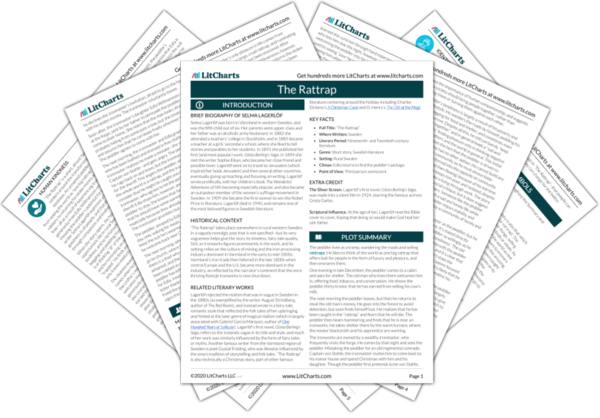Human Kindness
“The Rattrap” is a short, almost fairy-tale story that centers around the transforming power of human kindness. An unnamed peddler of rattraps goes from seeing the world as “one big rattrap” and engaging in robbery to returning his stolen money and proclaiming himself free—all as a result of experiencing true kindness and generosity from Edla Willmansson on Christmas Eve. By showing the peddler’s potential for positive change, Swedish writer Selma Lagerlöf expresses a belief that…
read analysis of Human KindnessTrust vs. Cynicism
As “The Rattrap” begins, the homeless peddler is defined by his “rattrap” philosophy of life: that the world is nothing but a big rattrap that offers “bait” in the form of luxuries and pleasures, and then ensnares and ruins anyone who reaches for this bait. This is a fundamentally cynical worldview, and one that the story ultimately undercuts by showing its limitations and offering an alternate philosophy. Though life can be harsh and…
read analysis of Trust vs. CynicismLoneliness and Companionship
Connected to the themes of kindness and trust, “The Rattrap” also explores the basic human need for companionship and community, and shows the negative effects of loneliness, whether as a result of poverty, cynicism, or unkindness. At the start of the story, the peddler leads an incredibly lonely existence, and this affects him in extremely negative ways, causing him unhappiness and bitterness, and driving him to steal from and lie to others. Through the peddler’s…
read analysis of Loneliness and Companionship
Identity and Naming
While it is primarily focused on the potential for goodness within people and the interactions between them, “The Rattrap” also concerns itself with issues of identity, especially the construction of identity through actions and choices, and the role that names can play in this process. Ultimately, the story suggests that identity is a fluid thing, and people can change or be changed to inhabit different identities based on their choices and the actions of others.
…
read analysis of Identity and Naming






